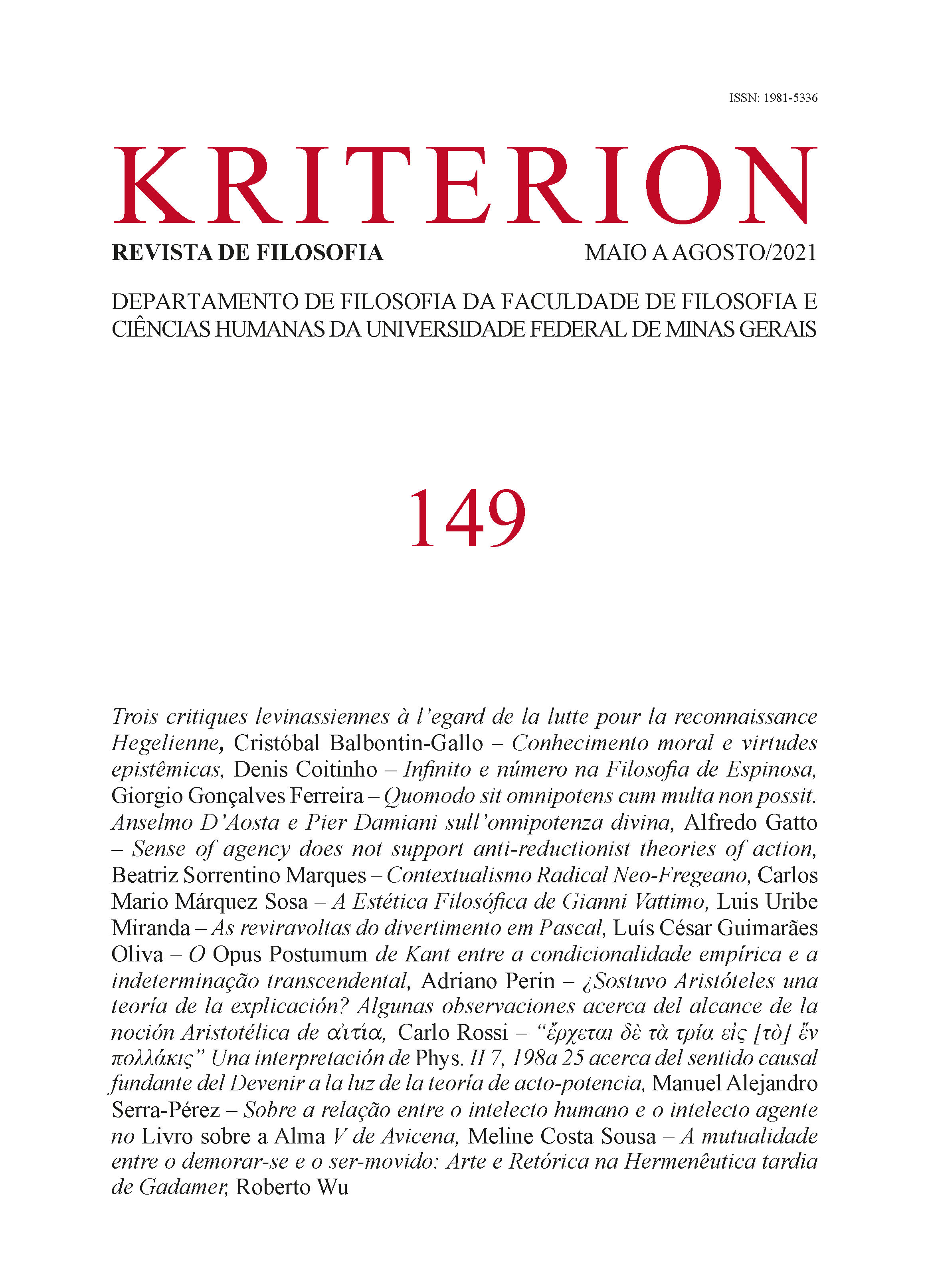QUOMODO SIT OMNIPOTENS CUM MULTA NON POSSIT. ANSELM OF AOSTA AND PETER DAMIAN ABOUT DIVINE OMNIPOTENCE
Keywords:
Peter Damian, Anselm of Aosta, Divine Omnipotence, Faith and Dialectics, Lanfranc of Pavia, , Berengar of ToursAbstract
The article aims to analyse the debate that characterized
the Eleventh Century in the light of divine omnipotence, with particular regard
to the speculations of Peter Damian and Anselm of Aosta. After presenting the
dispute between Lanfranc of Pavia and Berengar of Tours about the role and
the function of the ars dialectica, the article focuses on Damian’s De divina
omnipotentia, underling the radicalism of the approach defended by the Italian
monk. The article proceeds by analysing the position supported by Anselm in the
Proslogion, in the De libertate arbitrii, in the De casu diaboli and in the Cur
Deus homo, with the aim of highlighting the centrality of Anselm’s approach
in the later history of Medieval philosophy.
Downloads
References
ENDRES, J. A. “Lanfranc Verhältnis zur Dialektik”. Der Katolik, 25, 1902, pp. 215–231.
_______. “Othlohs von Sankt Emmeram Verhältnis zu den freien Künsten, insbesondere zur Dialektik”. Philosophisches Jahrbuch, 17, 1904, pp. 44–52 e 173–184.
_______. “Die Dialektiker und ihre Gegner im 11. Jahrhundert”. Philosophisches Jahrbuch, 19, 1906, pp. 20–33.
_______. “Petrus Damiani und die weltliche Wissenschaft”. Beiträge zur Geschichte der Philosophie des Mittelalters, Vol. VIII/3. Münster: Aschendorff, 1910.
ANSELMUS CANTUARIENSIS. “Monologion”. “Proslogion”. “De libertate arbitrii”. “De casu diaboli”. “Cur Deus homo”. In: F. S. Schmitt (ed.). Opera Omnia (VI Vols.). Apud Th. Nelson: Edinburgh, 1946-1961. Tradução para o italiano de Sofia Vanni Rovighi. Laterza: Roma-Bari 1969 (“Monologio”, “Proslogio”, “La libertà di arbitrio”, “La caduta del diavolo”). Tradução para o italiano de Antonio Orazzo. Città Nuova: Roma 2007 (“Perché un Dio uomo?”).
BERINGERIUS TURONENSIS. “Rescriptum contra Lanfrancum”. Tourhout: Brepols, 1988.
CANTIN, A. “Saint Pierre Damien et la culture de son temps”. Studi gregoriani, 10, 1975, pp. 247-285.
CANTIN, A. “Fede e dialettica nell’XI secolo”. Tradução para o italiano de Filadelfo Ferri. Milano: Jaca Book, 1996.
CORVINO F. “Studi di filosofia medievale”. Bari: Adriatica, 1974.
COURTENAY, W. J. “Necessity and Freedom in Anselm’s Conception of God”. Analecta Anselmiana, IV/2, 1975, pp. 39-64.
DELLA SERRA, M. “Non omnia potens. Spunti per una grammatica dell’onnipotenza in Anselmo d’Aosta”. Gregorianum, Vol. 91, Nr. 1., 2010, pp. 29-42.
DE MONTCLOS. J. “Lanfranc et Bérenger. La controverse eucharistique du XIe siècle”. Louvain: Peeters, 1971.
GIBSON, M. “Lanfranc of Bec”. Oxford: Oxford University Press, 1978. Tradução para o italiano de Pierluigi Fiorini. Milano: Jaca Book, 1989.
GILSON, É. “La philosophie au moyen âge”. Paris: Payot, 1922. Tradução para o italiano de Maria Assunta del Torre. Firenze: Sansoni, 2005.
GONSETTE, J. “Pierre Damien et la culture profane”. Louvain: Nauwelaerts, 1956.
HENRY, D. P. “The logic of Saint Anselm”. Oxford: Clarendon Press, 1967.
HOLOPAINEN, T. J. “Dialectic and Theology in the Eleventh Century”. Boston-Leiden: Brill, 1996.
HOLOPAINEN, T. J. “Necessity in Early Medieval Thought: Peter Damiani and Anselm of Canterbury”. In: P. Gilbert, H. K. Kohlenberger, E. Salmann (eds.). Cur Deus Homo. Atti del Congresso Anselmiano Internazionale (Roma, 21-23 maggio 1998). Roma: Herder, 1999. pp. 221-234.
LANFRANCUS CANTUARIENSIS. “De Corpore et Sanguine Domini”. PL 150, 407-442. Tradução para o italiano de Concetto Martello. Catania: Cuecm, 2001. pp. 100-164.
MARENBON, J. “Early Medieval Philosophy (480–1159). An introduction”. London: Routledge & K. Paul, 1983.
MOONAN, L. “Impossibility and Peter Damian”. Archiv für Geschichte der Philosophie, 62, 1980. pp.146-163.
MORRISTON, W. “Omnipotence and the Anselmian God”. Philo, Vol. 4, n. 1, 2001, pp. 7-20.
PARODI, M. “Improprietas verborum”. In: M. T. F. B. Brocchieri (ed.). Sopra la volta del mondo. Onnipotenza e potenza assoluta di Dio tra Medioevo e Età moderna. Bergamo: Lubrina, 1986. pp. 123-128.
PETRUS DAMIANUS. “De vera felicitate et sapientia”. In: K. Reindel (ed.). Die Briefe des Petrus Damiani (IV Vols). München: Monumenta Germaniae Historica. Die Briefe der Deutschen Kaiserzeit, 1983-1993. Brief 23 (Vol. I), 1983. Tradução para o italiano de Adelelmo Dindelli, Costanzo Somigli. Città Nuova: Roma, 2001.
PETRUS DAMIANUS. “De Sancta Simplicitate Scientiae Inflanti Anteponenda”. In: K. Reindel (ed.). Die Briefe des Petrus Damiani (IV Vols). München: Monumenta Germaniae Historica. Die Briefe der Deutschen Kaiserzeit, 1983-1993. Brief 117 (Vol. III), 1989.
PETRUS DAMIANUS. “Lettre sur la toute–puissance divine”. Ed. André Cantin. Paris: Les éditions du Cerf, 1972. Tradução para o italiano de Alfredo Gatto. Il Prato: Padova, 2013.
GATTO, A. “Pier Damiani. Una teologia dell’onnipotenza”. Roma: Aracne, 2013.
REMNANT, P. “Peter Damian: Could God Change the Past?”. Canadian Journal of Philosophy, 8, 1978, pp. 259-268.
RESNICK, I. M. “Divine Power & Possibility in St. Peter Damian’s De Divina Omnipotentia”. Boston-Leiden: Brill, 1992.
RICHÉ, P. “Écoles et enseignement dans le Haut Moyen Âge”. Paris: Aubier, 1979.
_______. “L’enseignement des arts libéraux en Italie et en France au XI siècle”. In: G. D’Onofrio (ed.). Lanfranco di Pavia e l’Europa dell’XI secolo (1089-1989). Roma: Herder, 1993. pp. 157-166.
SCIUTO, I. “Il problema della ragione in Lanfranco, Berengario e Pier Damiani in relazione all’opera di Anselmo d’Aosta”. In: G. D’Onofrio (ed.). Lanfranco di Pavia e l’Europa dell’XI secolo (1089-1989). Roma: Herder, 1993. pp. 595-607.
THOMAS DE AQUINO. “Quaestiones quodlibetales”. Editio Leonina. Roma-Paris: Éditions du Cerf, 1996. Tradução para o italiano de Roberto Coggi. Bologna: Edizioni Studio Domenicano, 2003.










